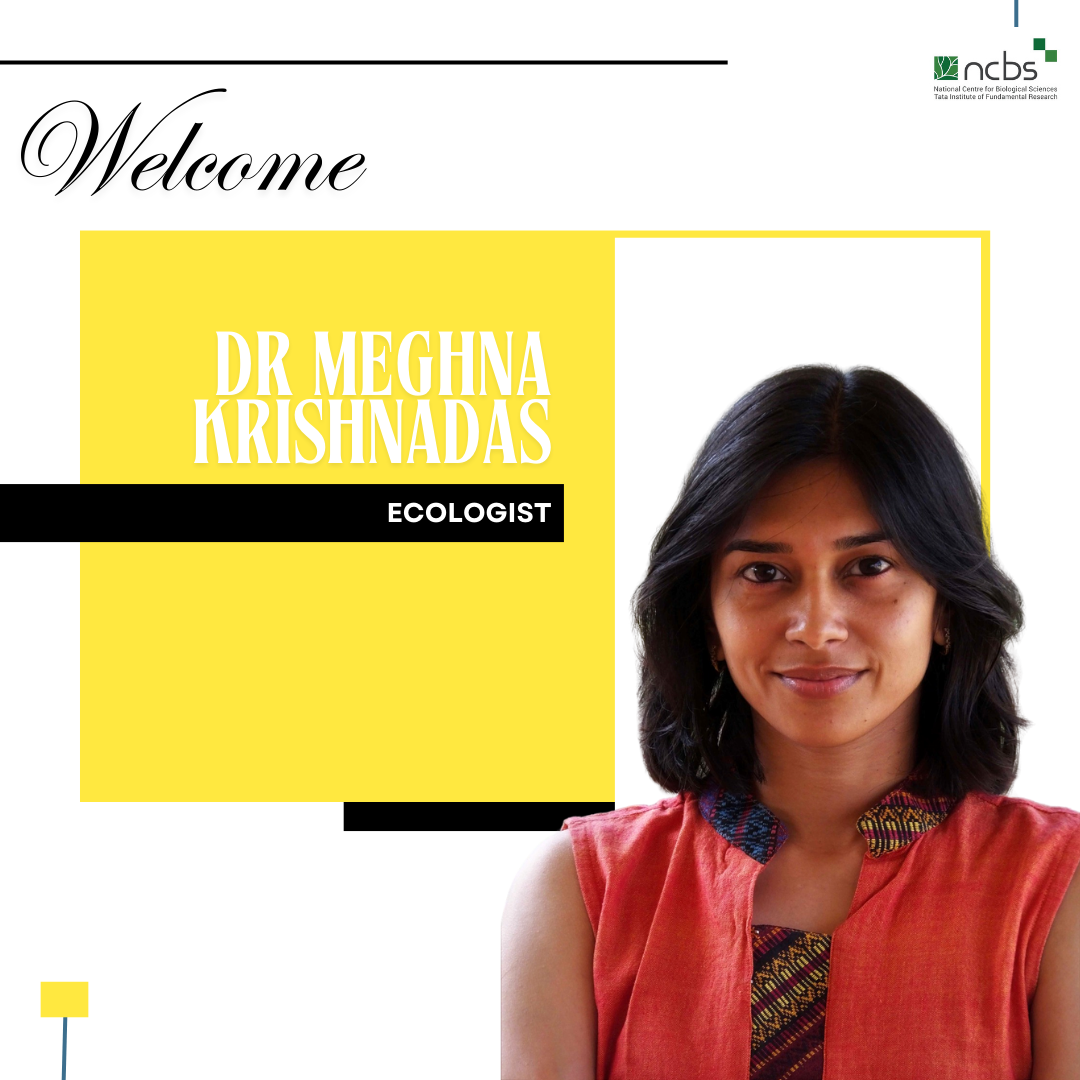In a quiet corner of the Eastern Laboratory Complex, Dr Meghna Krishnadas is setting up her new space. Her lab on the second floor is gearing up to launch an exciting line of research, bringing together a passionate team of ecologists. Last month, Meghna joined NCBS as an Assistant Professor, to explore new frontiers in the plant community.
“For many wildlife biologists, plants are just the background. For me, that background is very much alive. There's a lot of action going on there. I am fascinated by the interactions among plants and also of plants with other organisms- such as fungi, insects or rodents that eat their seeds and disperse them. What does that mean for the plant community?”
On a sunny day, beneath the glass roof outside Simons Centre for Living Machines, with the scent of coffee drifting in from the nearby canteen, Meghna reflects on her unconventional path. Once an MBBS doctor, she is now a community ecologist, studying the intricate dynamics of plant communities and species interactions. She shares her story and recalls the decisive moments and fortunate twists that led her to trade a stethoscope for fieldwork.
"My life has been so serendipitous at so many moments that I’m sometimes amazed at where I am now," says Meghna. It all began during a visit to a medical college friend and a senior who was working with the Soliga community in the forests of the BR Hills of Karnataka. As she wandered through the forest, she recalls being captivated by a flash of the vibrant- Scarlet Minivet. She did not know what it was at the time, but the striking sight of the bird lingered with her. Back at her friend’s NGO office, she identified it using a well-worn copy of Salim Ali’s bird guide. On another walk, she came upon her first Sambhar deer.
“That visceral, almost physical connection with nature was unlike anything I had ever experienced. It completely changed how I saw the world," Meghna explains. She began seeking out volunteering opportunities in wildlife projects, and before long, her fascination grew so much that she found herself at a crossroads—choosing between a career in public health or carving a new path in ecology. Amid frantic phone calls from family suggesting she pursue wildlife photography to solve her career dilemmas, Meghna decided to enrol in the Wildlife Biology and Conservation program at NCBS.
I think for the longest time, I was trying very hard to balance my curiosity about the natural world versus doing something conservation-oriented, says Meghna. “But late into my PhD at Yale University in the US, I realized that the intellectual challenge of doing science is something I love, and it aligns perfectly with my mindset.” Choosing science over other career options was a pivotal moment for Meghna, and it continues to shape her work. “The bedrock of information we create and explore is essential for conservation decisions. A lot of what I do in community ecology can have real-world applications—whether it's habitat restoration, management, policy-making, or predicting global climate change–even if not right away. Understanding how ecosystems are likely to respond to these rapidly changing times requires solid foundational science,” she adds. Meghna is excited to explore a different perspective in future– outcomes of species interactions on an evolutionary timescale.
Meghna notes that in Indian academia, research lacking tightly controlled laboratory experiments is often viewed as less robust and significant. "Academia is hard anywhere, but in India, it is even harder". She advocates for more flexible systems to support long-term ecological research, also expressing her disappointment at the limited number of institutions that facilitate collaboration with local communities—an aspect she believes is essential for ecological studies. "There have been days when I have questioned whether the existing systems will allow me to pursue the kind of work I truly want to do”.
Despite these challenges, Meghna remains optimistic. She believes more institutions will follow the example of NCBS in enhancing their capacity, building expertise, and establishing laboratories that support the field of ecology. Reflecting on the Indian Wildlife and Ecology Conference at NCBS this year, she highlights how it brought together passionate ecologists from across the country, sparking exciting discussions and demonstrating India's growing ability and commitment to advancing ecological and conservation science.
However, the field of conservation science remains small, competitive, and often skewed against women. Young women in the field face various hardships, spending long periods in remote areas without basic amenities, where cases of misconduct and harassment are concerningly common but distressingly ignored. To address these issues, Meghna is determined to create a safe and inclusive environment in her lab. Her team will follow a strict code of conduct that emphasizes respect for diversity, with regular conversations ensuring that everyone feels comfortable raising concerns. I will do my best to support my team and address each situation as effectively as possible, she adds, as she looks forward to welcoming new passionate students into her lab.









0 Comments